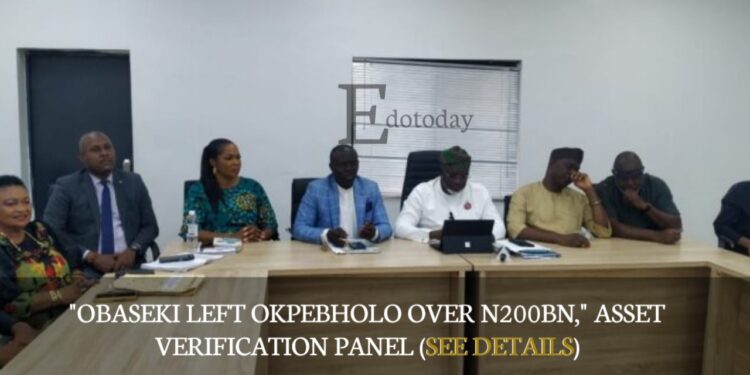The Edo State Assets Verification Committee announced Thursday that the state does not own any equity shares in the Museum of West African Arts, or MOWAA, even though the Godwin Obaseki administration committed N3.8 billion in its creation.
The committee’s chairman, Dr. Ernest Afolabi Umakhihe, revealed this during a news conference in Benin, saying it went against the previous administration’s assertion that Edo State had no ownership in the project because it had not made any investments in it.
This comes shortly after Dr. Umakhihe revealed that the Obaseki administration had saddled Governor Monday Okpebholo with a substantial financial load of over N200 billion in unpaid invoices to contractors managing the State’s road projects.
According Umakhihe, “the Museum of West Africa Arts, MOWAA, is captured as an independent private trust sitting on government land, while the Ministry of Arts, Culture and Tourism has minimal supervision on the project.”
“To date, Edo State has no equity stake in MOWAA even though the state had spent N3.8billion as a contribution,” he said.
Obaseki claimed to have demolished the hospital to construct the Stella Obasanjo Hospital, a better facility, during the official opening of the Museum of West African Art, MOWAA, Institute and Campus in Benin City last November.
The head of the Assets Committee stated that the project’s ongoing work would not be halted, but he also mentioned that the committee would meet with the governor to discuss the next steps.
“If the project will be beneficial to the state, it is only the governor that will decide what next steps to take either to take ownership or not,” he said.
Speaking on roads, Dr Umakhihe disclosed that the immediate past government left a huge financial burden of about N200 billion to the new government of Monday Okpebholo being outstanding payment to contractors handling road projects in the State. He also revealed that some of the road projects awarded by the Obaseki government were not properly documented.
Umakhihe said, “the road projects were not properly documented in the records of the Ministry of Roads and Bridges, now the Ministry of Works presented to the committee”
According to the committee chairman, who also asserted that the road projects were awarded in 2024, the contractors were only given mobilization. He also noted that some contractors disclosed that the money was sometimes returned to government officials, which he claimed slowed down the pace of road construction.
The committee also noted a lack of oversight by the overseeing ministries, departments, and agencies, or MDAs; the former permanent secretary of the Federal Ministry of Agriculture and Food Security further disclosed, claiming that the awarding of the roads was allegedly influenced by the governorship election on September 21, 2024.
“There was also non-adherence to the Edo State Public Procurement Law in the award of major contracts, which also led to several dubious variations of contract sums.”
“In some cases, the variations were higher than the initial contract sum,” he said.
Umakhihe however, disclosed that the committee has informed the Governor of the need to utilize the opportunity of the dry season to continue some of the hurriedly awarded road projects across the state.
According to him, we cannot deny Edo people the opportunity of a good road network, especially during this dry season, hence the need for the government to quickly act in good time to sustain some of the ongoing road projects.
“There are huge outstanding commitments in respect of road infrastructure. No matter how indecent some of our findings are, the government has to explore the dry season to make an appreciable intervention in road construction,” he added.
Umakhihe said the press briefing was to update and avail the general public some of the committee’s findings which form an interim report they have forwarded to the Governor to act on.
He said that the committee which would be going on recess will resume on January 6, 2025, to continue its assignment as captured in the terms of reference, hence, the need to present some findings to guide the operations of government and governance.












